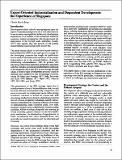| dc.contributor.author | Beng, Cheah Hock | en |
| dc.date.accessioned | 2016-04-08T09:51:10Z | |
| dc.date.available | 2016-04-08T09:51:10Z | |
| dc.date.issued | 01/12/1980 | en |
| dc.identifier.citation | Beng, C., H. (1980) Export?Oriented Industrialisation and Dependent Development: the Experience of Singapore. The IDS Bulletin 12(1): 35-41 | en |
| dc.identifier.issn | 1759-5436 | en |
| dc.identifier.uri | https://opendocs.ids.ac.uk/opendocs/handle/20.500.12413/10748 | |
| dc.description.abstract | SUMMARY Export?oriented industrialisation (EOI) is now advocated for developing countries—in reaction to the reputed failures of import substitution, as efficient and competitive and beneficial to employment (because based on comparative advantages in labour?intensive manufacture). But the dependency school argues that it has high economic and social cost via foreign investment — mainly by metropolitan MNCs, and imported technology. Singapore's experience shows both the constraints and opportunities of integration into the international economy. Undoubtedly, its success derives partly from specific circumstances — location, infrastructure skills and stable leadership. The advocates of EOI overestimated the flexibility of the international economy and its capacity and willingness to accommodate the growing exports of manufactures from the NICs. But the critics certainly underestimated the possibility of such growth in developing country exports. | en |
| dc.format.extent | 7 | en |
| dc.publisher | Institute of Development Studies | en |
| dc.relation.ispartofseries | The IDS Bulletin Vol. 12 Nos. 1 | en |
| dc.rights.uri | http://www.ids.ac.uk/files/dmfile/IDSOpenDocsStandardTermsOfUse.pdf | en |
| dc.title | Export?Oriented Industrialisation and Dependent Development: the Experience of Singapore | en |
| dc.type | Article | en |
| dc.rights.holder | © 1980 Institue of Development Studies | en |
| dc.identifier.doi | 10.1111/j.1759-5436.1980.mp12001007.x | en |

